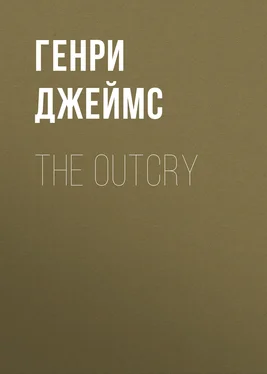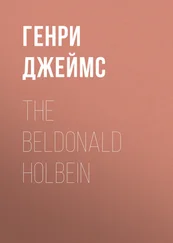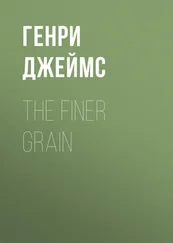Генри Джеймс - The Outcry
Здесь есть возможность читать онлайн «Генри Джеймс - The Outcry» — ознакомительный отрывок электронной книги совершенно бесплатно, а после прочтения отрывка купить полную версию. В некоторых случаях можно слушать аудио, скачать через торрент в формате fb2 и присутствует краткое содержание. Жанр: foreign_antique, foreign_home, visual_arts, на английском языке. Описание произведения, (предисловие) а так же отзывы посетителей доступны на портале библиотеки ЛибКат.
- Название:The Outcry
- Автор:
- Жанр:
- Год:неизвестен
- ISBN:нет данных
- Рейтинг книги:5 / 5. Голосов: 1
-
Избранное:Добавить в избранное
- Отзывы:
-
Ваша оценка:
- 100
- 1
- 2
- 3
- 4
- 5
The Outcry: краткое содержание, описание и аннотация
Предлагаем к чтению аннотацию, описание, краткое содержание или предисловие (зависит от того, что написал сам автор книги «The Outcry»). Если вы не нашли необходимую информацию о книге — напишите в комментариях, мы постараемся отыскать её.
The Outcry — читать онлайн ознакомительный отрывок
Ниже представлен текст книги, разбитый по страницам. Система сохранения места последней прочитанной страницы, позволяет с удобством читать онлайн бесплатно книгу «The Outcry», без необходимости каждый раз заново искать на чём Вы остановились. Поставьте закладку, и сможете в любой момент перейти на страницу, на которой закончили чтение.
Интервал:
Закладка:
“No, not at all, I think, like Mr. Bender.”
This appeared to move in the elder woman some deeper thought “May I ask then—if one’s to meet him—who he is?”
“Oh, father knows—or ought to—that I sat next him, in London, a month ago, at dinner, and that he then told me he was working, tooth and nail, at what he called the wonderful modern science of Connoisseurship—which is upsetting, as perhaps you’re not aware, all the old-fashioned canons of art-criticism, everything we’ve stupidly thought right and held dear; that he was to spend Easter in these parts, and that he should like greatly to be allowed some day to come over and make acquaintance with our things. I told him,” Lady Grace wound up, “that nothing would be easier; a note from him arrived before dinner–”
Lady Sandgate jumped the rest “And it’s for him you’ve come in.”
“It’s for him I’ve come in,” the girl assented with serenity.
“Very good—though he sounds most detrimental! But will you first just tell me this —whether when you sent in ten minutes ago for Lord John to come out to you it was wholly of your own movement?” And she followed it up as her young friend appeared to hesitate. “Was it because you knew why he had arrived?”
The young friend hesitated still. “‘Why ‘?”
“So particularly to speak to you.”
“Since he was expected and mightn’t know where I was,” Lady Grace said after an instant, “I wanted naturally to be civil to him.”
“And had he time there to tell you,” Lady Sand-gate asked, “how very civil he wants to be to you?”
“No, only to tell me that his friend—who’s off there—was coming; for Kitty at once appropriated him and was still in possession when I came away.” Then, as deciding at last on perfect frankness, Lady Grace went on: “If you want to know, I sent for news of him because Kitty insisted on my doing so; saying, so very oddly and quite in her own way, that she herself didn’t wish to ‘appear in it.’ She had done nothing but say to me for an hour, rather worryingly, what you’ve just said—that it’s me he’s what, like Mr. Bender, she calls ‘after’; but as soon as he appeared she pounced on him, and I left him—I assure you quite resignedly—in her hands.”
“She wants”—it was easy for Lady Sandgate to remark—“to talk of you to him.”
“I don’t know what she wants,” the girl replied as with rather a tired patience; “Kitty wants so many things at once. She always wants money, in quantities, to begin with—and all to throw so horribly away; so that whenever I see her ‘in’ so very deep with any one I always imagine her appealing for some new tip as to how it’s to be come by.”
“Kitty’s an abyss, I grant you, and with my disinterested devotion to your father—in requital of all his kindness to me since Lord Sandgate’s death and since your mother’s—I can never be too grateful to you, my dear, for your being so different a creature. But what is she going to gain financially,” Lady Sand-gate pursued with a strong emphasis on her adverb, “by working up our friend’s confidence in your listening to him—if you are to listen?”
“I haven’t in the least engaged to listen,” said Lady Grace—“it will depend on the music he makes!” But she added with light cynicism: “Perhaps she’s to gain a commission!”
“On his fairly getting you?” And then as the girl assented by silence: “Is he in a position to pay her one?” Lady Sandgate asked.
“I dare say the Duchess is!”
“But do you see the Duchess producing money—with all that Kitty, as we’re not ignorant, owes her? Hundreds and hundreds and hundreds!”—Lady Sandgate piled them up.
Her young friend’s gesture checked it. “Ah, don’t tell me how many—it’s too sad and too ugly and too wrong!” To which, however, Lady Grace added: “But perhaps that will be just her way!” And then as her companion seemed for the moment not quite to follow: “By letting Kitty off her debt.”
“You mean that Kitty goes free if Lord John wins your promise?”
“Kitty goes free.”
“She has her creditor’s release?”
“For every shilling.”
“And if he only fails?”
“Why then of course,” said now quite lucid Lady Grace, “she throws herself more than ever on poor father.”
“Poor father indeed!”—Lady Sandgate richly sighed it
It appeared even to create in the younger woman a sense of excess. “Yes—but he after all and in spite of everything adores her.”
“To the point, you mean”—for Lady Sandgate could clearly but wonder—“of really sacrificing you?”
The weight of Lady Grace’s charming deep eyes on her face made her pause while, at some length, she gave back this look and the interchange determined in the girl a grave appeal. “You think I should be sacrificed if I married him?”
Lady Sandgate replied, though with an equal emphasis, indirectly. “ Could you marry him?”
Lady Grace waited a moment “Do you mean for Kitty?”
“For himself even—if they should convince you, among them, that he cares for you.”
Lady Grace had another delay. “Well, he’s his awful mother’s son.”
“Yes—but you wouldn’t marry his mother.”
“No—but I should only be the more uncomfortably and intimately conscious of her.”
“Even when,” Lady Sandgate optimistically put it, “she so markedly likes you?”
This determined in the girl a fine impatience. “She doesn’t ‘like’ me, she only wants me—which is a very different thing; wants me for my father’s so particularly beautiful position, and my mother’s so supremely great people, and for everything we have been and have done, and still are and still have: except of course poor not-at-all-model Kitty.”
To this luminous account of the matter Lady Sand-gate turned as to a genial sun-burst. “I see indeed—for the general immaculate connection.”
The words had no note of irony, but Lady Grace, in her great seriousness, glanced with deprecation at the possibility. “Well, we haven’t had false notes. We’ve scarcely even had bad moments.”
“Yes, you’ve been beatific!”—Lady Sandgate enviously, quite ruefully, felt it. But any further treatment of the question was checked by the re-entrance of the footman—a demonstration explained by the concomitant appearance of a young man in eyeglasses and with the ends of his trousers clipped together as for cycling. “This must be your friend,” she had only time to say to the daughter of the house; with which, alert and reminded of how she was awaited elsewhere, she retreated before her companion’s visitor, who had come in with his guide from the vestibule. She passed away to the terrace and the gardens, Mr. Hugh Crimble’s announced name ringing in her ears—to some effect that we are as yet not qualified to discern.
IV
Lady Grace had turned to meet Mr. Hugh Crimble, whose pleasure in at once finding her lighted his keen countenance and broke into easy words. “So awfully kind of you—in the midst of the great doings I noticed—to have found a beautiful minute for me.”
“I left the great doings, which are almost over, to every one’s relief, I think,” the girl returned, “so that your precious time shouldn’t be taken to hunt for me.”
It was clearly for him, on this bright answer, as if her white hand were holding out the perfect flower of felicity. “You came in from your revels on purpose—with the same charity you showed me from that first moment?” They stood smiling at each other as in an exchange of sympathy already confessed—and even as if finding that their relation had grown during the lapse of contact; she recognising the effect of what they had originally felt as bravely as he might name it. What the fine, slightly long oval of her essentially quiet face—quiet in spite of certain vague depths of reference to forces of the strong high order, forces involved and implanted, yet also rather spent in the process—kept in range from under her redundant black hat was the strength of expression, the directness of communication, that her guest appeared to borrow from the unframed and unattached nippers unceasingly perched, by their mere ground-glass rims, as she remembered, on the bony bridge of his indescribably authoritative (since it was at the same time decidedly inquisitive) young nose. She must, however, also have embraced in this contemplation, she must more or less again have interpreted, his main physiognomic mark, the degree to which his clean jaw was underhung and his lower lip protruded; a lapse of regularity made evident by a suppression of beard and moustache as complete as that practised by Mr. Bender—though without the appearance consequent in the latter’s case, that of the flagrantly vain appeal in the countenance for some other exhibition of a history, of a process of production, than this so superficial one. With the interested and interesting girl sufficiently under our attention while we thus try to evoke her, we may even make out some wonder in her as to why the so perceptibly protrusive lower lip of this acquaintance of an hour or two should positively have contributed to his being handsome instead of much more logically interfering with it. We might in fact in such a case even have followed her into another and no less refined a speculation—the question of whether the surest seat of his good looks mightn’t after all be his high, fair, if somewhat narrow, forehead, crowned with short crisp brown hair and which, after a fashion of its own, predominated without overhanging. He spoke after they had stood just face to face almost long enough for awkwardness. “I haven’t forgotten one item of your kindness to me on that rather bleak occasion.”
Читать дальшеИнтервал:
Закладка:
Похожие книги на «The Outcry»
Представляем Вашему вниманию похожие книги на «The Outcry» списком для выбора. Мы отобрали схожую по названию и смыслу литературу в надежде предоставить читателям больше вариантов отыскать новые, интересные, ещё непрочитанные произведения.
Обсуждение, отзывы о книге «The Outcry» и просто собственные мнения читателей. Оставьте ваши комментарии, напишите, что Вы думаете о произведении, его смысле или главных героях. Укажите что конкретно понравилось, а что нет, и почему Вы так считаете.












